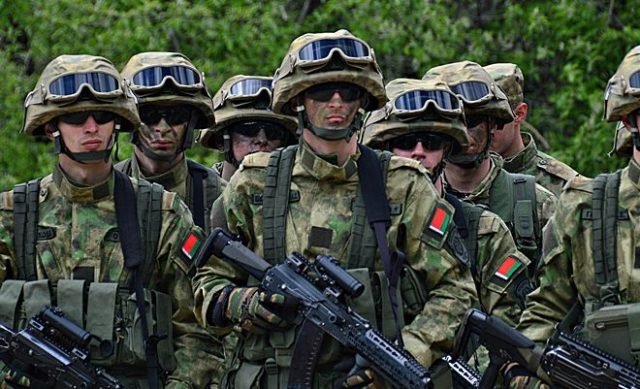
Belarusian Military Rapidly Degrading
Publication: Eurasia Daily Monitor Volume: 15 Issue: 74
By:

Almost no one in Minsk—or indeed anywhere else—expects that the Belarusian military could repel an invasion by Russian forces. The balance of power between the two countries is simply too lopsided and Russian penetration of Belarus too large. But additionally, recent reporting strongly suggests that the Belarusian military, which retains many of the worst features of Soviet times, is rapidly degrading internally. Thus, it cannot fulfill three other critical tasks that the armed forces of any country perform: It is no longer a source of pride but of alienation among the Belarusian population; it cannot integrate draftees into the nation and instead is having exactly the opposite effect; and it is not in a position to effectively back up the Belarusian police and security services in the event of a massive challenge to President Alyaksandr Lukashenka’s regime.
That should be a wake-up call for the Belarusian authorities. But the evidence seems to indicate that, while they are aware of the problem, they have not figured out how to respond other than with further propaganda about how good things are and more repression against anyone who suggests otherwise. Evidence is mounting, however, that the situation in the Belarusian military is rapidly deteriorating, with widespread reports of dedovshchina (hazing of new recruits by older ones), indiscipline, corruption, alcoholism, and general incompetence. And Belarusians, even those opposed to the regime, are worried about what that means for the future of their country. Among those now sounding the alarm is Andrey Parotnikov, who heads the Belarus Security Blog (Belsat TV, March 30, May 9).
One indication of just how bad things are, Parotnikov says, is that the Belarusian military cannot retain even those who want to become officers and serve their country: Between 2011 and 2015, he reports, 49 percent of young officers left service before completing their contract period; and of the more than 500 graduates of officer training schools last year, only 59 are serving in the military or elsewhere in the security services. Some obviously are leaving because they see greater economic opportunities outside of the uniformed services, but most appear to be appalled by the conditions that now exist in the Belarusian military and their fears that things will not improve but only worsen in the coming months and years (Belsat TV, March 30).
On the one hand, there have been continuing revelations about the mistreatment of soldiers and junior officers in the media and about the failure of the high command to punish those responsible, even in the case of the deaths of soldiers. Such reports have reduced the authority of the army in the eyes of the population (Belsat TV, April 5, 20, May 4, 14).
And on the other hand, officers can see, in Parotnikov’s words, that “the force structures have never been a priority of the authorities” and that there is no reason to expect any change given that Minsk would need an infusion of cash from Moscow—which is less and less likely since a weak Belarusian military serves the Kremlin’s purposes. Without a strong force of its own, Minsk has to rely even more on Moscow than would otherwise be the case. That is hardly the kind of situation that breeds loyalty and enthusiasm among commanders, soldiers or the wider population (Belsat TV, February 13, March 16, April 20).
Exacerbating all these difficulties, the Belarusian military analyst says, are two vestiges of the Soviet past. First of all, the Belarusian military continues to operate just like its Soviet predecessor: it is closed off from society and so Belarusians have little reason to trust it because the only stories that come out are those highlighting the military’s problems. But those are real and growing worse, Parotnikov continues. And second, Belarusian officers continue to receive their training overwhelmingly in Russian military schools rather than in their own national ones, reducing still further their loyalty to Belarus and their ability to integrate their soldiers into the Belarusian nation.
Lukashenka regularly praises the military—he enjoys wearing a uniform, dressing up his son in one, and appearing with members of the Armed Forces. But he seems oblivious to the fact that, over the last few years, the educational level of officers has fallen as has their respect for law, the Belarusian analyst continues. Even the interior ministry has acknowledged that “the number of violations of law” in the uniformed services is “extraordinary.” But neither the Minsk regime nor senior officers have found a way out except by doing what their Soviet predecessors would have done—issue calls for greater discipline and more ideological work, and challenge any negative coverage.
Belarusians “love to talk about how with [them] things will not be like they have been in Ukraine” because of the country’s military and security forces, Parotnikov says. “Of course, things will not be like in Ukraine, because here there are other conditions. But this does not mean that things will be better for us in such a situation.” With the military rapidly decaying and losing its ability to integrate and defend the country, it is almost certain that when the political system is shaken to its foundation, the Belarusian military will not be in a position to help put things back together. In that, he concludes, there is a real difference with Ukraine—but it is not a distinction that speaks in Belarus’ favor (Belsat TV, March 30).



